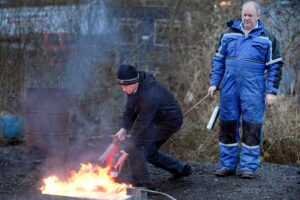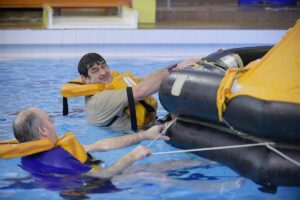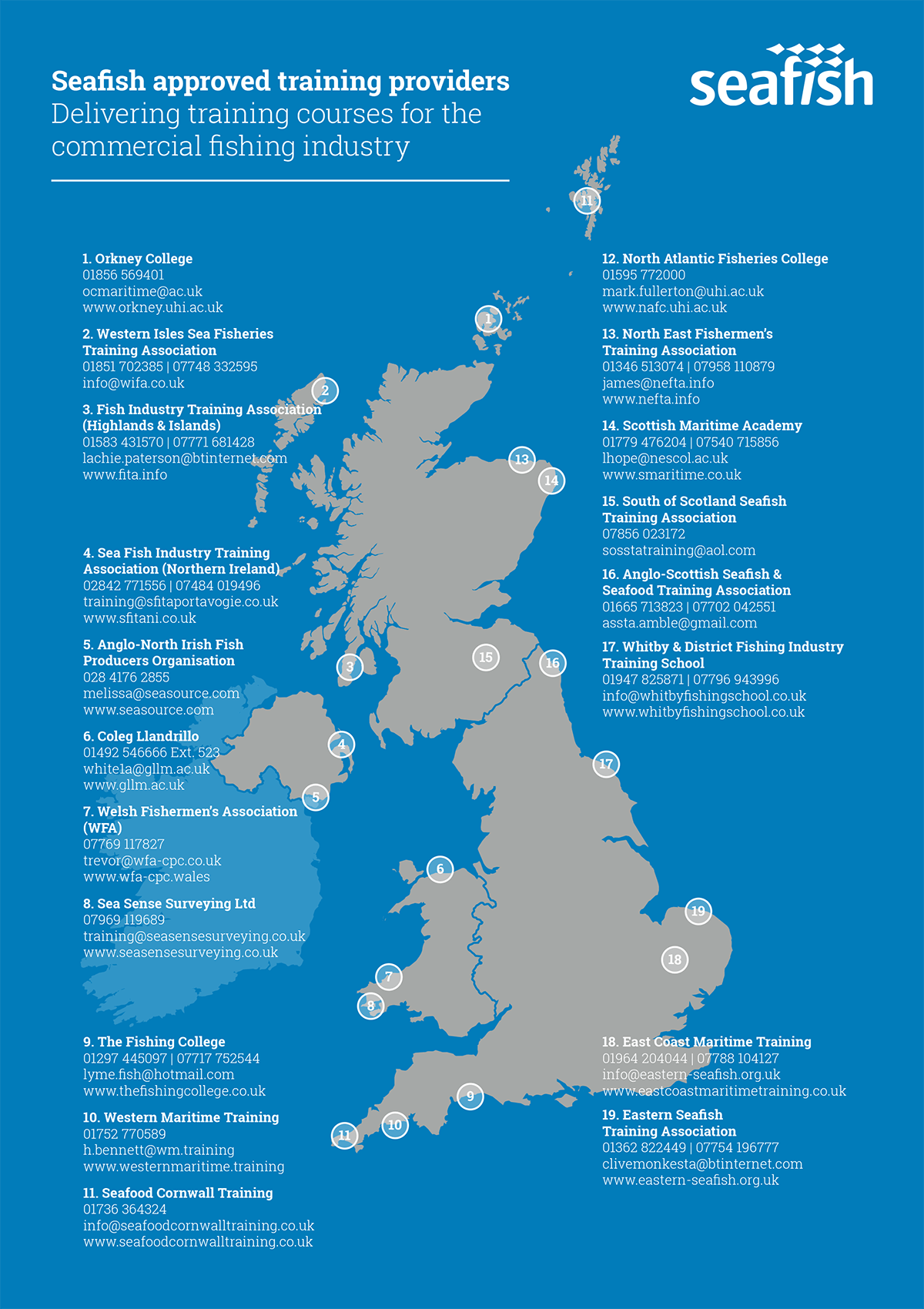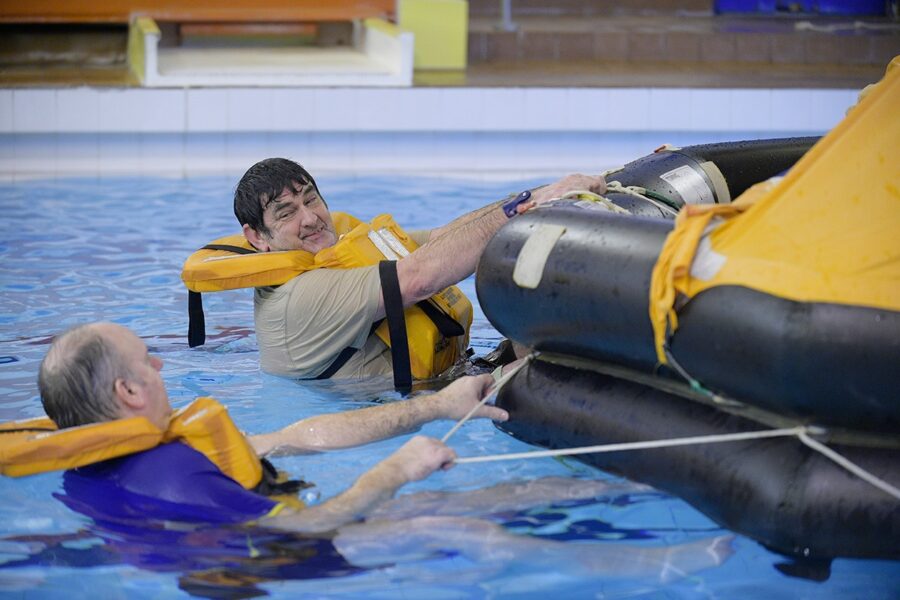After a disrupted year, training provision is restarting, say the Seafish safety and training team – so book those courses now!
The pandemic has disrupted all our lives in one way or another. Whilst it has been great to see fishing vessels back out to sea after some major lockdowns last year, the lack of access to basic safety training has been a challenge.
Sadly, seven men lost their lives while working on fishing vessels over the past six months. It’s important that vessel owners and skippers make safety training for their crew a priority as lockdowns ease and training starts again.
Basic safety training is a legal requirement – anyone working on a commercial fishing vessel in the UK must complete basic safety training.
The training regulations are very simple:
- New entrants must complete a one-day Basic Sea Survival training course before starting work. They must complete one-day courses in Basic Health and Safety, Basic First Aid and Basic Fire Fighting within three months.
- Anyone working on a fishing vessel for two years or more must also have completed the one-day Safety Awareness training course.
Temporary changes to training requirements
During the pandemic, the Maritime and Coastguard Agency (MCA) relaxed these requirements, allowing those working on fishing vessels more time to comply. There are currently extensions in place to cover anyone who has been unable to complete training. However, it is important to know that:
- Vessel owners and skippers must provide the necessary safety information to any new crew, or those who haven’t been able to complete all courses. This includes what to do in emergencies, and going over risk assessments.
- Any new crew members must be registered with Seafish to ensure there is a record of who needs to be trained once restrictions are lifted. This can be done by emailing: training@seafish.co.uk
Full details on the temporary changes are available from the MCA, and can be found on the gov.uk website by searching ‘fishermen’s short course requirements MIN 411’.

A young fisherman under instruction on a firefighting course.
Enhanced safety training with the Introduction to Commercial Fishing course
The various lockdowns implemented in response to the pandemic seriously disrupted training delivery. However, with restrictions starting to ease, the network of Seafish-approved training providers has restarted delivering this vital, lifesaving training.
Some providers have been able to restart delivery of the three-week Introduction to Commercial Fishing course for new entrants. The Anglo Scottish Seafish Training Association (ASSTA) in Northumberland has just completed its first cohort of new entrants since the pandemic began.
The course gives a basic overview of all aspects of working on a fishing vessel, including knots, splicing, repairing nets and pots, watchkeeping and engineering. Safety is at the heart of the course, and students also complete the four mandatory safety courses.
The course is paid for by Seafish via funds from the MMO’s Marine and Fisheries Fund and the MCA. This can make it an attractive option financially for vessel owners and skippers, since they then have access to crew who already have the required training.
More importantly, they have crew who may be even more safety-aware than those who just do the four mandatory courses.
Dennis Osborne has been running the Introduction to Commercial Fishing course for almost eight years. He says that safety runs through everything they teach. “Over the 15 days of the course, there isn’t a day that safety doesn’t come up. Whether we’re talking about mending nets or keeping watch, safety always comes into it. We talk about the risks and hazards of everything, not just what’s covered in the four mandatory courses.”
He believes that giving new entrants this experience before they go to work on a fishing vessel can make the industry safer. “We need to get people before they go out to work. It’s important they know that safety starts on the quayside – before they’ve even stepped on the boat.”
His course has a high success rate, with over 70% of those who complete the course staying on in the industry. It’s not just for young people, either. Anyone who is new to fishing can take the course.
“I taught a guy a few years ago who then gave up his garage business, moved to the North East and bought himself a fishing vessel. His second vessel sank, and he told me that the course had saved his life, because he used everything he’d been taught to save himself that day.
“He now says he only wants to use crew who do the Introduction to Commercial Fishing course, because he feels safer with them. He knows they’ve been thinking about safety from day one.”
John Wilton is 21 and from Sunderland. He has just completed the Introduction to Commercial Fishing Course with Dennis at ASSTA. His dad is a fisherman, and after considering university, John decided to decline the place he had at Sunderland University and opt for a career in fishing.
He has spent time reading about accidents and fatalities on fishing vessels, and believes the course has given him the knowledge and awareness needed to be safe at sea. “Being a fisherman isn’t the safest job in the world. But I think most incidents happen through lack of education or awareness.
“Although the course covered lots of skills like net mending, engineering and navigation, the focus was actually health and safety. Dennis talked about it every day, as did anyone who came to talk to us. Regardless of the topic, safety always came into the conversation.”

Sea survival training will restart as soon as access to pools is available, but bookings are being taken now.
Book your safety training now
Now is the time to ask about booking training. MCA surveyors are busy around the coast inspecting fishing vessels again. They may take into consideration circumstances where crew haven’t been able to attend mandatory safety training courses due to restrictions caused by the pandemic. Evidence of course bookings should be presented to the MCA surveyor.
Training providers are still required to follow Covid-19 safety protocols, which means smaller class sizes, so it may take longer to complete a course.
It’s worth noting that not all courses can be delivered in all parts of the UK yet. Delivery of Sea Survival training remains a challenge for many training providers, who are still unable to access the public swimming pools they need for the wet drills. However, they may start to take future bookings.
Nineteen training providers across the UK are approved to deliver Seafish courses. For some of the mandatory courses, the MCA does accept other equivalent certificates.
For help in finding a course, get in touch with the training team at Seafish. You can email: training@seafish.co.uk, or if you want to speak to someone, call:
- Simon Potten, head of safety and training: 07876 035743
- Lee Haigh, training advisor: 07904 660484
- Sharon Hewitt, training administrator: 07814 818931
- Melissa Power, training administrator: 07814 818930
More information on safety training is available on the Seafish website. Find a map of Seafish approved training providers below.

This feature was taken from the latest issue of Fishing News. Subscribe here for more great content on the UK and Irish commercial fishing industry.








